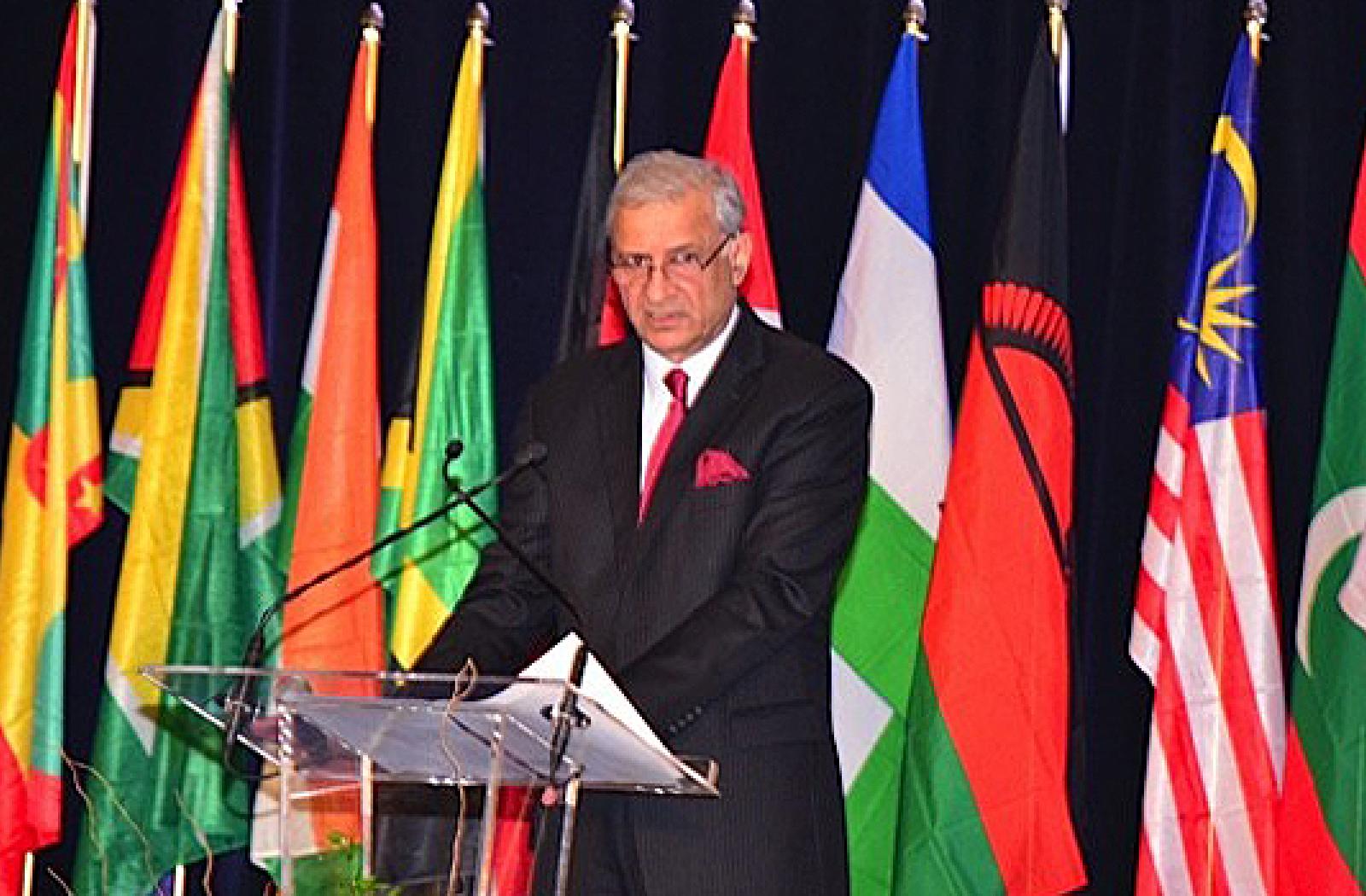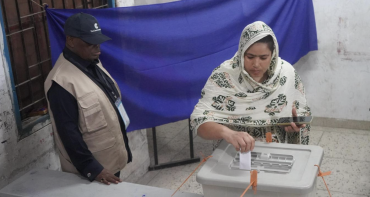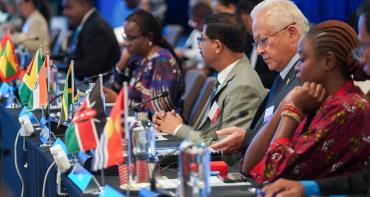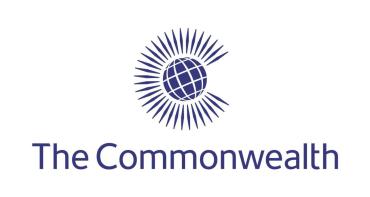Commonwealth Secretary-General Kamalesh Sharma

Honourable ministers and Attorneys-General, distinguished delegates, Commonwealth friends…
It is a great pleasure to welcome you to Marlborough House, headquarters of The Commonwealth.
The Charter of The Commonwealth 2013
On Commonwealth Day this year Her Majesty The Queen, Head of the Commonwealth, came here to sign the new Charter of The Commonwealth.
The Charter was adopted collectively by Commonwealth Heads of Government on 19 December 2012.
It sets out the commitment of our 54 member states to strive collectively for the advancement of democracy and equal rights, with peace and prosperity so that all can share the benefits of social and economic development.
Commonwealth values
The Charter brings together under 16 headings, and in a single accessible document, the values and aspirations which unite The Commonwealth – development, democracy, human rights and the rule of law.
Shared commitment to one of those central Commonwealth values, the rule of law, and responsibility for upholding it, is what draws us here today.
The Charter states:
"We believe in the rule of law as an essential protection for the people of The Commonwealth and as an assurance of limited and accountable government. In particular we support an independent, impartial, honest and competent judiciary and recognise that an independent, effective and competent legal system is integral to upholding the rule of law, engendering public confidence and dispensing justice.”
Small Jurisdictions
In addition to our collective commitment to the rule of law, we are united by another overriding concern of the Commonwealth, the needs of small states.
These too are recognised in the Charter. Article 14 states:
“We are committed to assisting small and developing states in The Commonwealth, including the particular needs of small island developing states, in tackling their particular economic, energy, climate change and security challenges, and in building their resilience for the future.”
We are conscious that small states can be particularly vulnerable in certain areas. The Commonwealth Secretariat, and The Commonwealth family more widely, are committed to offering assistance in overcoming these challenges, which in legal affairs often stem from a lack of capacity and limited resources.
It is therefore good to see that in the course of your discussions you will be addressing
Commonwealth Secretariat - Legal and Constitutional Affairs Division (LCAD)
As law ministers and law officers, much of your interaction with the Commonwealth Secretariat takes place through the Legal and Constitutional Affairs Division.
In serving the needs and requests of member states, and strengthening the work of other divisions here at the Secretariat, LCAD derives its mandate from member states.
You have before you a report of the work done by LCAD, which sets out what has been achieved and work currently being undertaken for small jurisdictions.
This includes work of a more general nature that has specific relevance for small states, such as international co-operation on anti-corruption, anti-money laundering and cybercrime.
Partnership
Many regions and nations currently find themselves at present under particular and often multiple stress. There are pressures relating to economic affairs, to political stability and to regional security.
In these circumstances The Commonwealth, as a values-based organisation, continues to play a distinctive role, especially through the creation of partnerships and by the promotion of dialogue.
Our aim is to help bring about practical results that make a positive impact in the lives and on the welfare of citizens in our member states.
In order to achieve this, co-operation and collaboration are becoming ever more important to the way in which we work.
We encourage mutual support of our Commonwealth organisations in the legal field, and welcome opportunities for working with the UN and its agencies, to achieve our goals.
Such mutual support makes us stronger and better able to deal with shared concerns and to overcome challenges.
New Strategic Plan 2013/14 - 2016/17 and future work
The Commonwealth Secretariat’s new Strategic Plan for the period 2013/14–2016/17 has now been approved by member states.
It is prioritised and results-oriented – and was designed with the benefit of having the goals of our new Charter in the forefront of our thinking.
The Plan reflects the shared priorities of member governments and focuses on those areas where The Commonwealth and the Secretariat have distinct strengths and advantages.
It opens a new chapter for the Secretariat and will bring freshness and innovation to the way in which we work.
The first of the Plan’s three goals is: “strong democracy, rule of law, promotion and protection of human rights and respect for diversity”.
This meeting therefore provides an opportunity to reflect on our work with and for small states, particularly in the area of rule of law, and to see how the Secretariat can respond better to the needs of small states.
It will be helpful to have your views as we develop our work programme to implement the new Plan.
Commonwealth Connects
‘Commonwealth Connects’, our secure cloud-based digital platform provides new tools whereby we can work together more quickly and more closely.
The platform enables people from across the Commonwealth to build interactive working partnerships using internet-enabled communication on computers or mobile smartphones and other devices.
And it facilitates pan-Commonwealth collaboration across countries, organisations and partners. Information can be stored centrally and is accessible to any network member.
‘Commonwealth Connects’ is already populated by over one hundred communities of practice. You could explore the benefit to you of this important new resource.
Work begun at this meeting can be carried forward collaboratively and in real time to achieve effective impact far more rapidly than has ever before been possible.
This shows The Commonwealth playing to its fundamental strengths – its networks, its diversity and its collective practical advancement – both in a contemporary twenty-first century way and the tested way of Commonwealth solidarity.
Judicial and legal education
Honourable ministers, I now move on to some of those aspects of our work of specific relevance to small jurisdictions.
You are well aware of our Commonwealth understanding of the separation of powers between the three branches of Government: Parliament, the Executive and the Judiciary.
The Latimer House Principles affirm that: “An independent, impartial, honest and competent judiciary is integral to upholding the rule of law, engendering public confidence and dispensing justice”.
They go on to state that: “An independent, effective and competent legal profession is fundamental to the upholding of the rule of law and the independence of the judiciary”.
Continuing focus on education and training is vital to ensuring the judicial and legal professions are competent and properly equipped to guard their independence.
Small jurisdictions face particular challenges in this regard, and I trust you will share your experiences and particular needs.
Draft Model Act on Integrity in Public Life
Connected to this is the need for integrity in public life.
Here I would recall that, in 2007, law ministers of small Commonwealth jurisdictions asked the Secretariat to develop a model code of conduct for public officials, designed to meet the particular needs and requirements of small jurisdictions, and including guidelines on conflict of interest and supporting legislative provisions.
In pursuance of this request, regional seminars and consultations were held and I am glad that a draft model Act is now before us.
We hope that, as a result of your examination of the model Act, it will be approved for use throughout small Commonwealth jurisdictions and adapted to particular needs.
Tackling backlogs in criminal cases
Many small Commonwealth jurisdictions face the problem of large backlogs of criminal cases awaiting hearing. Delays may occur at any stage until the disposal of cases.
Several small Commonwealth jurisdictions have requested guidance on tackling such backlogs through reforms to criminal justice procedures and rules of evidence.
The Secretariat conducted a preliminary survey of small Commonwealth jurisdictions to gauge the extent of the problem of backlogs in criminal cases, and where there are features of the criminal justice laws and processes that contribute to delay.
The paper for the meeting identifies the contributing factors to backlogs of criminal cases, and identifies systemic, procedural, legal, financial and cultural issues which act as exacerbating factors.
Possible solutions are also suggested in the paper, together with guidance and a model template.
We trust your discussions will culminate in the adoption of the model template which will help you tackle the problem of backlogs in your jurisdictions.
Protection of witnesses of serious criminal offences
The Secretariat also has continuing work to enhance the capacity and efficiency of criminal justice actors and systems to prevent and combat crime, in particular transnational organised crime.
Reforms to victim and witness protection are considered as one of the key tools in this regard.
Meeting in Accra in 2005, law ministers adopted the Commonwealth Statement on Basic Principles of Justice for Victims of Crime.
More recently in Sydney in 2011, law ministers adopted the Best Practice Guide for the Protection of Victims and Witnesses in the Criminal Justice Process. This Guide has been disseminated widely within Commonwealth jurisdictions.
Following consultations with small jurisdictions and a request from member countries to specifically address the issue of witness protection measures in small jurisdictions, a paper will be presented at this meeting on best practice measures for the protection of witnesses of serious criminal offences - which may have transnational elements.
We hope the recommendations of the paper will be found fit for adoption and use in your jurisdictions, as an adjunct to the Best Practice Guide.
Money laundering and terrorist financing
Corruption, money laundering and terrorist financing hinder economic development and are serious threats to financial sector security and economic growth.
Strong anti-money laundering and combating the financing of terrorism regimes help protect a financial system against – and provide for the detection of – profit-driven crime, and the investigation, restraint and recovery of the proceeds of crime.
The Financial Action Task Force has developed 40 recommendations to be implemented by member states to address these threats. The challenge, however, has been with the effective implementation of these recommendations by member states, particularly small Commonwealth jurisdictions.
Following consultations and requests from member states for assistance in this area, the Secretariat has collaborated with other relevant agencies to conduct a survey on small jurisdictions’ compliance with the Financial Action Task Force and OECD regimes. The findings of this exercise will be presented to you.
The three main impediments to effective implementation are:
- lack of resources
- over-reliance on a single agency, and
- lack of a national strategy and national co-ordination
A paper has been prepared which offers recommendations and which will, we trust, assist in overcoming these challenges.
Equality and violence against women
The Commonwealth Plan of Action for Gender Equality 2005-2015, sets the context within which we seek to advance women’s rights and gender equality through the implementation of appropriate laws and mechanisms.
The Secretariat is committed to advancing gender mainstreaming in the field of law. We therefore look forward to continuing to work in close co-operation with law ministries, the judiciary and national women’s machineries.
Mandatory testing and HIV/AIDS in prisons in the Commonwealth
The incidence of HIV/AIDS in prisons is a health and social issue of increasing concern in the Commonwealth today.
In addressing this topic, a rights-based approach is needed – particularly in view of collective Commonwealth commitments set out in our new Charter.
Article 2 states:
“We are committed to equality and respect for the protection and promotion of civil, political, economic, social and cultural rights, including the right to development, for all without discrimination on any grounds as the foundations of peaceful, just and stable societies.”
Then Article 11 goes on to state:
“We recognise the necessity of access to affordable health care, education, clean drinking water, sanitation and housing for all citizens and emphasise the importance of promoting health and well-being in combating communicable and non-communicable diseases.”
Dealing with HIV/AIDS in prisons shows how practical action is needed if we are to live up to the aspirations and commitments of the Charter.
Climate Change
Similarly with climate change, which is an issue of major importance for many countries represented here, since your populations tend to suffer disproportionately from its impact.
Of 100 countries classified globally as most vulnerable, almost half – 45 – are Commonwealth states. And of those 45, 31 are Commonwealth small states.
This year a Commonwealth Expert Group on Climate Finance was established. It is chaired by former President Bharrat Jagdeo of Guyana.
Its objective is to identify practical actions that can be taken by The Commonwealth so that access to climate finance is made easier for our small and vulnerable states.
Key advocacy messages will also be refined that can be carried forward by The Commonwealth to the wider international community.
The Group’s report and recommendations will be presented to the Commonwealth Heads of Government Meeting in Sri Lanka this November.
Commonwealth Heads of Government Meeting (CHOGM)
Indeed, with CHOGM now only two months away, your deliberations on this and other matters of shared concern can help create the road map for the way in which The Commonwealth collectively moves forward.
The inclusive and equitable order to which we aspire, with respect for the dignity of all, depends on access to justice with the independent, impartial and competent upholding of the rule of law.
I thank you all for your participation and wish this meeting every success.



